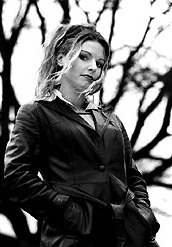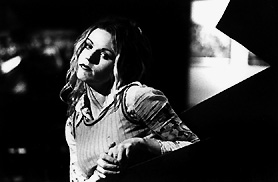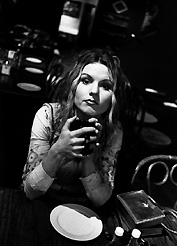
A Rose by Any Other Name...
The Rose Chronicles' Kristy Thirsk
Interview by Pieter Hofmann
Photography by Dan Zubkoff
45-second excerpt from "Voice in Jail" (352 Kb .au file)
It's quite apparent from the opening bars of the
latest Rose Chronicles album,
Happily Ever After, that
change is in the air. While still washed in their trademark ethereal
sound, the axis of the disc revolves around a rawer, less meticulously-produced
sound. Although still swirling in luscious pirouettes reminiscent
of the Cocteau Twins and Dead Can Dance, vocalist Kristy Thirsk
and guitarist Richard Maranda have added an edge that was merely
negligible on their previous release, 1994's Shiver.
 Signing with Nettwerk Records in 1992, after, amazingly,
playing only two live shows, Rose Chronicles released the critically-acclaimed
EP Dead and Gone to Heaven in 1993. Shortly afterwards,
the Vancouver group provided their first full-length, Shiver,
which also yielded favourable reviews. Thirsk says, "When
we signed with Nettwerk, Richard and myself never went out shopping
for labels. We were young and just surprised at how quickly things
were happening. Anyhow, I just thought, wow, that's Sarah McLachlan's
label!"
Signing with Nettwerk Records in 1992, after, amazingly,
playing only two live shows, Rose Chronicles released the critically-acclaimed
EP Dead and Gone to Heaven in 1993. Shortly afterwards,
the Vancouver group provided their first full-length, Shiver,
which also yielded favourable reviews. Thirsk says, "When
we signed with Nettwerk, Richard and myself never went out shopping
for labels. We were young and just surprised at how quickly things
were happening. Anyhow, I just thought, wow, that's Sarah McLachlan's
label!"
 While the band was only in the studio for two months
to record Happily Ever After, three producers found their
way onto the album's jacket credits. Twiddling the dials at various
times, Greg Reely, Mike Plotnikoff (The Cranberries, Devlins)
and Kevin Hamilton (Moist, Mollies Revenge) each left their own
indelible mark on Happily Ever After. Why three producers?
While the band was only in the studio for two months
to record Happily Ever After, three producers found their
way onto the album's jacket credits. Twiddling the dials at various
times, Greg Reely, Mike Plotnikoff (The Cranberries, Devlins)
and Kevin Hamilton (Moist, Mollies Revenge) each left their own
indelible mark on Happily Ever After. Why three producers?
"It wasn't by choice," Thirsk explains.
"What happened was that Greg didn't really produce. We produced
and did pre-production with Kevin. We liked his ideas and mixes
but we didn't want everything to sound the same. I guess you could
say we wanted to put different flavours into the songs. So we hired
Greg to do some of the mixes and kept some of Kevin's mixes."
They handed the tapes over to Nettwerk, but the company
wasn't completely satisfied with the end result. "They wanted
a rawer sound, and they thought that the single ['Voice in
Jail'] wasn't coming across the way it should. So we contacted
Mike and went up to Bryan Adams' studio and re-mixed a few songs."
 Often compared to vocalist Elizabeth Fraser of the
Cocteau Twins, Thirsk seems comfortable with the similarity.
"At first I felt really insecure about that. She is an influence
-- but then so is Siouxsie and the Banshees, even Cyndi Lauper.
But now as long as I'm not compared to someone who sucks, it's
fine. It's better than if someone said 'You sound like tires squealing.'"
Often compared to vocalist Elizabeth Fraser of the
Cocteau Twins, Thirsk seems comfortable with the similarity.
"At first I felt really insecure about that. She is an influence
-- but then so is Siouxsie and the Banshees, even Cyndi Lauper.
But now as long as I'm not compared to someone who sucks, it's
fine. It's better than if someone said 'You sound like tires squealing.'"
With a hint of the surreal, Happily Ever After
gorgeously smothers the mind with layers of sweet soundscapes.
Centered on Maranda's guitar textures and Thirsk's soprano,
it is quite easy to become gently bathed in the sonic beauty of
the album.
 Lyrically, however, there are trolls under every
bridge, as Thirsk's delicious hiccuppy-vocals gloss over
the sombre lyrical content culled from her pen. Betraying the
beautiful atmosphere of "Acquiesce," Thirsk sings, "See
me dance through the noose/Will I choke to death/When I'm laughing?"
Asked where she finds inspiration for her lyrics, she says dryly,
"From the darkest pits of hell." Questioned further,
she jokingly pinpoints this to be the Starbucks on Commercial
Drive.
Lyrically, however, there are trolls under every
bridge, as Thirsk's delicious hiccuppy-vocals gloss over
the sombre lyrical content culled from her pen. Betraying the
beautiful atmosphere of "Acquiesce," Thirsk sings, "See
me dance through the noose/Will I choke to death/When I'm laughing?"
Asked where she finds inspiration for her lyrics, she says dryly,
"From the darkest pits of hell." Questioned further,
she jokingly pinpoints this to be the Starbucks on Commercial
Drive.
"I can't say I'll never write a happy-hippy
pop song, but I just write what comes naturally to me. We named
the album Happily Ever After simply because we thought
it was an ironic title and reality doesn't
usually have storybook endings. I do have a feeling,
though, that on the next Alannis [Morrisette] album her songs
aren't going to be that angry. I don't see how she can be angry
anymore."
First published in Drop-D Magazine on December 20, 1996
Index |
Search |
E-mail |
Info |
Copyright
Considering copying some of the images from this story?
Please read this first. Thanks.
 Signing with Nettwerk Records in 1992, after, amazingly,
playing only two live shows, Rose Chronicles released the critically-acclaimed
EP Dead and Gone to Heaven in 1993. Shortly afterwards,
the Vancouver group provided their first full-length, Shiver,
which also yielded favourable reviews. Thirsk says, "When
we signed with Nettwerk, Richard and myself never went out shopping
for labels. We were young and just surprised at how quickly things
were happening. Anyhow, I just thought, wow, that's Sarah McLachlan's
label!"
Signing with Nettwerk Records in 1992, after, amazingly,
playing only two live shows, Rose Chronicles released the critically-acclaimed
EP Dead and Gone to Heaven in 1993. Shortly afterwards,
the Vancouver group provided their first full-length, Shiver,
which also yielded favourable reviews. Thirsk says, "When
we signed with Nettwerk, Richard and myself never went out shopping
for labels. We were young and just surprised at how quickly things
were happening. Anyhow, I just thought, wow, that's Sarah McLachlan's
label!"

 While the band was only in the studio for two months
to record Happily Ever After, three producers found their
way onto the album's jacket credits. Twiddling the dials at various
times, Greg Reely, Mike Plotnikoff (The Cranberries, Devlins)
and Kevin Hamilton (Moist, Mollies Revenge) each left their own
indelible mark on Happily Ever After. Why three producers?
While the band was only in the studio for two months
to record Happily Ever After, three producers found their
way onto the album's jacket credits. Twiddling the dials at various
times, Greg Reely, Mike Plotnikoff (The Cranberries, Devlins)
and Kevin Hamilton (Moist, Mollies Revenge) each left their own
indelible mark on Happily Ever After. Why three producers?
 Often compared to vocalist Elizabeth Fraser of the
Cocteau Twins, Thirsk seems comfortable with the similarity.
"At first I felt really insecure about that. She is an influence
-- but then so is Siouxsie and the Banshees, even Cyndi Lauper.
But now as long as I'm not compared to someone who sucks, it's
fine. It's better than if someone said 'You sound like tires squealing.'"
Often compared to vocalist Elizabeth Fraser of the
Cocteau Twins, Thirsk seems comfortable with the similarity.
"At first I felt really insecure about that. She is an influence
-- but then so is Siouxsie and the Banshees, even Cyndi Lauper.
But now as long as I'm not compared to someone who sucks, it's
fine. It's better than if someone said 'You sound like tires squealing.'"
 Lyrically, however, there are trolls under every
bridge, as Thirsk's delicious hiccuppy-vocals gloss over
the sombre lyrical content culled from her pen. Betraying the
beautiful atmosphere of "Acquiesce," Thirsk sings, "See
me dance through the noose/Will I choke to death/When I'm laughing?"
Asked where she finds inspiration for her lyrics, she says dryly,
"From the darkest pits of hell." Questioned further,
she jokingly pinpoints this to be the Starbucks on Commercial
Drive.
Lyrically, however, there are trolls under every
bridge, as Thirsk's delicious hiccuppy-vocals gloss over
the sombre lyrical content culled from her pen. Betraying the
beautiful atmosphere of "Acquiesce," Thirsk sings, "See
me dance through the noose/Will I choke to death/When I'm laughing?"
Asked where she finds inspiration for her lyrics, she says dryly,
"From the darkest pits of hell." Questioned further,
she jokingly pinpoints this to be the Starbucks on Commercial
Drive.